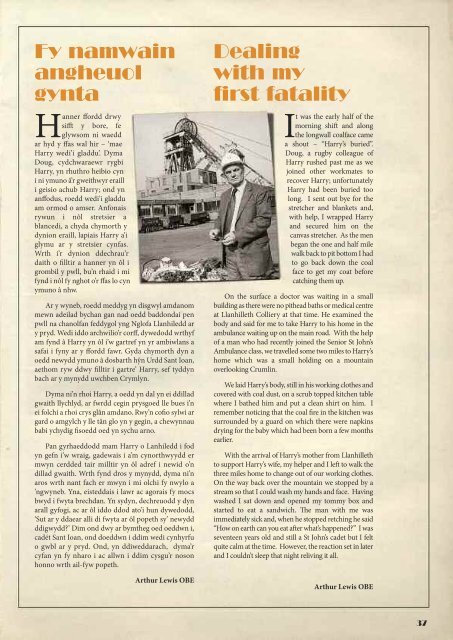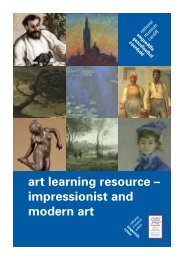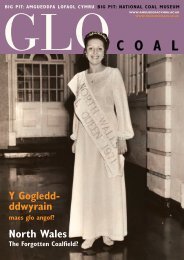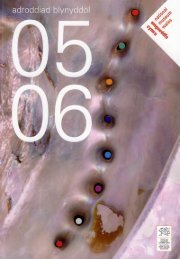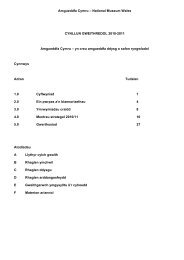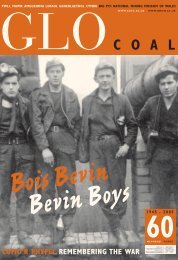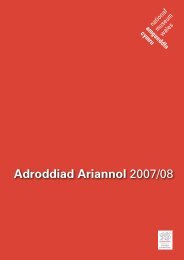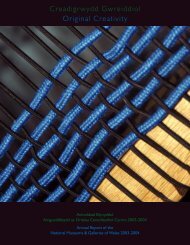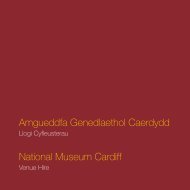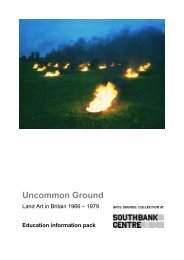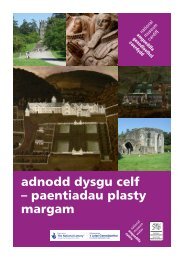Create successful ePaper yourself
Turn your PDF publications into a flip-book with our unique Google optimized e-Paper software.
O Gaint<br />
i Gymru<br />
Working<br />
in Kent<br />
Brodor o’r Blaenau, Sir Fynwy, oedd ’nhad, ond<br />
symudodd i weithio yng Nglofa Chislet, Swydd<br />
Caint, yn ystod y 1930au. Cefais fy ngeni yn<br />
Ramsgate ym 1936. Dechreuais weithio yn y sied<br />
lampau yng Nglofa Chislet pan oeddwn i’n bymtheg<br />
oed. Ar ôl troi’n ddeunaw, dechreuais weithio fel gwas<br />
colier ac yna’n löwr tan 1970 pan ddes i’n ddyn hedins.<br />
Pan gaeodd Chislet ym 1963, symudais i Lofa<br />
Tilmanstone tan i honno gau ym 1986.<br />
Treuliais gyfnod byr yn gweithio yn ne Cymru ym<br />
1969. Daeth fy nheulu gyda mi ar wyliau, ond fe<br />
arhosom ni am dri mis yn y diwedd a chefais waith<br />
yng Nglofa Rose Heyworth. Yna bu farw fy nhad, a<br />
dychwelais i Gaint. Tra’r oeddwn i’n gweithio yng<br />
Nglofa Rose Heyworth, roedd fy ngwraig yn feichiog<br />
ac aeth i Ysbyty Blaina. Si brynhawn oedd hi, a<br />
dyma’r heddwas yn cnocio’r drws a dweud wrthyf am<br />
fynd i’r ysbyty cyn gynted â phosib. Roedd e’n<br />
gwrthod rhoi li i mi, felly roedd rhaid i mi gerdded<br />
drwy’r glaw trwm!<br />
A minnau’n un ar hugain oed, roeddwn i’n<br />
gweithio ar y ffas lo yn Chislet pan ddisgynnodd fy<br />
ffrind o flaen y peiriant torri glo a cholli’i goes. Cafodd<br />
forffin, ac roedd rhaid i mi gario’r goes wedi’i lapio<br />
mewn brethyn bradis a dilyn y stretsier am ryw ddwy<br />
filltir at y sia. Pan gyrhaeddon ni’r wyneb, gadewais<br />
y goes ar fwrdd yr ystafell ambiwlans, gyda’r esgid ar<br />
ei droed o hyd. Roeddwn i’n sâl fel ci pan es i mas.<br />
Cefais dri diwrnod i ffwrdd, heb dâl.<br />
Dro arall, roeddem ar ein cwrcwd tu ôl i’r tybiau<br />
glo yn yr hedins, yn cysgodi rhag y gwaith tanio.<br />
Dyma ddarn o garreg yn bownsio i lawr y llwybr, taro<br />
dolen ac yna bwrw’r dirprwy yn anymwybodol.<br />
Roedd rhaid i ni ei gario oddi yno, wedyn. ‘Doggy’<br />
oedd ei enw i ni, oherwydd bod ganddo goler ci am<br />
ei wddf er mwyn hongian ei lamp ddiogelwch. Brodor<br />
o Abertyleri oedd e, ac un diwrnod, roedden ni wedi<br />
paratoi’r hedin yn barod ar gyfer tanio ffrwydron pan<br />
ddaeth i mewn a dweud, ‘O yffach, wy’ di gadael y<br />
batri tanio tu fas!’ Felly, roedd rhaid i ni ddefnyddio<br />
batri’r lamp cap i danio’r ffrwydron, a dywedodd,<br />
‘Dim gair wrth neb neu fe gaiff pawb y sac’. O ran<br />
diogelwch, roedden ni’n torri sawl cornel gan ein bod<br />
ni’n cael ein talu ar sail cynnyrch, a bydden ni’n colli<br />
arian fel arall.<br />
Yn Chislet, roedd yna ddau Gymro eisiau gadael<br />
y pwll yn gynnar i wylio’r rygbi. Doedden nhw ddim<br />
yn gallu fforddio colli cyflog, felly fe benderfynon nhw<br />
ffugio anaf. Meddai un brawd wrth y llall, ‘Arhosa di<br />
fan hyn ac esgus bo’ ti wedi cael anaf, ac af i nôl y<br />
dirprwy’. Pan ddychwelodd gyda’r dirprwy, fe welodd<br />
ei frawd yn griddfan mewn poen ar lawr gan feddwl,<br />
‘Am actor da!’ Ond mewn gwirionedd, tra’r oedd yn<br />
cymryd arno’ i fod wedi anafu ar y llawr, disgynnodd<br />
carreg ar ei wyneb. Cafodd ei gludo mas ar stretsier a<br />
cholli’r gêm rygbi wedi’r cwbl.<br />
Bues i’n gofalu am lawer o fois dan hyfforddiant<br />
gydol fy ngyrfa, ac roedden ni bob amser yn chwarae<br />
tricie arnyn nhw. Roeddwn yn dweud wrthynt eu bod<br />
yn gorfod pasio prawf, a bydden ni’n gosod bloc o<br />
bren chwe modfedd o’u blaenau. Y gamp oedd torri’r<br />
pren yn ei hanner gydag un ergyd o’r fwyell, ond gyda<br />
mwgwd dros eu llygaid. Felly, roedden ni’n rhwymo<br />
hen sgarff am eu llygaid, ac yn sleifio eu bocs bwyd yn<br />
lle’r pren cyn iddyn nhw daro gyda’r fwyell. Alla i<br />
ddim ailadrodd eu hymateb nhw wedyn!<br />
‘Prawf ’ arall oedd gofyn iddyn nhw godi sach o<br />
lwch carreg dros eu pennau ddeg o weithiau. Roedden<br />
nhw’n credu bod hynny’n hawdd, ond wrth iddo<br />
godi’r sach, byddwn i’n sleifio’r tu ôl iddynt a gwneud<br />
twll gyda chyllell yn y sach fel bod y llwch yn tywallt<br />
drostyn nhw – roedd yn debyg i ddosbarthwr blawd!<br />
Aeth ‘Chalky’, un o’r glowyr dan hyfforddiant gyda<br />
mi, ymlaen i fod yn swyddog yr heddlu ac roedd ar y<br />
llinell biced yn ystod streic 1984-85. Gan ei fod yn<br />
gyn-löwr, roedd ei benaethiaid am iddo enwi ‘bwlis’<br />
undeb yr NUM, ond gwrthododd fradychu ei<br />
ffrindiau, a chafodd ei drosglwyddo.<br />
Arferwn i roi gwersi gyrru peiriant ar gledrau<br />
(gathering arm loader) i’r glowyr dan hyfforddiant. Un<br />
diwrnod, roedd un ohonyn nhw’n gyrru’r llwythwr<br />
pan ddaeth y dirprwy i mewn a gofyn, ‘Pwy sy’ ar y<br />
peiriant?’ ‘Gary’, atebais, ‘ma’r papurau da fe, ac ma<br />
fe’n gwneud yn dda iawn’. Wrth i mi orffen y<br />
frawddeg, bachodd Gary y peiriant yn y cylchoedd a<br />
oedd yn cynnal y llwybr cyn llwyddo i ddymchwel<br />
hanner yr hedin – aeth y dirprwy’n benwan!<br />
Does dim cofeb o fath yn y byd i’r diwydiant glo<br />
yng Nghaint. Lleiafrif oedd y glowyr yno, ac roedd y<br />
bobl leol yn troi’u trwynau arnom. Mae’n braf dod yn<br />
ôl i Gymru lle mae yna ymdeimlad cryf o falchder yn<br />
etifeddiaeth y diwydiant glo.<br />
Brian Webber<br />
My father was born in Blaina but moved to<br />
work in Chislet Colliery, Kent during the<br />
1930s. I was born in Ramsgate in 1936. I<br />
started work in the lamp room at Chislet when I was<br />
fieen years old.When I reached eighteen I started<br />
underground as a collier’s boy and later became a<br />
collier until 1970 when I became a heading man.<br />
Chislet closed in 1963 and I transferred to<br />
Tilmanstone until that colliery closed in 1986.<br />
I worked in south <strong>Wales</strong> for a short period during<br />
1969. I brought my family down for a holiday but<br />
actually stayed for three months and started work in<br />
Rose Heyworth Colliery. However, my father died and<br />
I transferred back to Kent. While I was in Rose<br />
Heyworth my wife was pregnant and in Blaina<br />
Hospital, I was on aernoon shi and a policeman<br />
knocked the door and told me that I had to get down<br />
to the hospital as soon as possible. He wouldn’t give<br />
me a li so I had to walk there in the pouring rain!<br />
When I was twenty-one I was working on the coal<br />
face in Chislet when my friend fell in front of the coal<br />
cutter and lost his leg. He was given morphine and I<br />
was given the leg wrapped up in brattice cloth and<br />
told to follow the stretcher for about two miles to the<br />
sha. When we got to the surface I put the leg on the<br />
ambulance room table, it still had the boot on the end<br />
of it. I went outside and was sick as a dog. I was given<br />
three days off without pay.<br />
Another time we were in the heading crouched<br />
down behind the tubs sheltering from shot firing. A<br />
piece of stone bounced down the roadway, hit a ring<br />
and then hit the deputy out cold so we had to carry<br />
him out. We used to call him ‘Doggy’ because he used<br />
to wear a dog collar around his neck to hang his flame<br />
safety lamp on. He was from Abertillery and one day<br />
we had prepared the heading ready for shot firing<br />
when he came in and said “O Christ, I’ve le the shot<br />
firing battery outside!” So we had to use a cap lamp<br />
battery to set the charge off and he said “Don’t tell<br />
anyone or we’ll all have the sack.” Talk about safety,<br />
we used to cut a lot of corners because we were on<br />
piecework and would lose money if we didn’t.<br />
ere were two Welsh brothers in Chislet who<br />
wanted to leave work early to watch the rugby but<br />
couldn’t afford to lose the pay so they decided to fake an<br />
injury. e one brother said to the other “You stay there<br />
and pretend to be injured and I’ll fetch the deputy”.<br />
When the brother came back with the deputy he saw his<br />
brother lying on the floor moaning and groaning and<br />
thought to himself “He’s a good actor!” But, in fact, while<br />
he was lying on the floor pretending to be injured, a stone<br />
Sied lampau, <strong>Glo</strong>fa Tilmanstone 1982. O’r chwith i’r dde: Gary Hardacre,<br />
Lloyd Stewert (‘Chalky’), Brian Webber, Mick Denny, Terry Ratlan<br />
Lamp room Tilmanstone Colliery 1982. From left to right: Gary Hardacre,<br />
Lloyd Stewert (‘Chalky’), Brian Webber, Mick Denny, Terry Ratlan<br />
had come down and cut his face open, so he had to be<br />
carried out on a stretcher and missed the rugby anyway.<br />
roughout my career I looked aer a lot of<br />
trainees and we used to always play tricks on them. I<br />
used to say that they had to pass a test and we used to<br />
get a six-inch block of wood and put it in front of<br />
them. ey were told that they had to cut it in half<br />
with one blow of the hatchet but they had to be<br />
blindfolded first. So we used to wrap an old scarf<br />
around their eyes and, just before they struck the<br />
blow, would put their food box in place of the wood.<br />
I can’t tell you what they would say to us aerwards!<br />
Another ‘test’ which we asked trainees to do was to li<br />
a bag of stone dust over his head ten times. ey thought<br />
that was easy but as he was doing it I used to sneak around<br />
behind him and slit the bag with a knife so that the dust<br />
went all over him – he looked like a flour grader!<br />
One of my trainees was called ‘Chalky’ and he later<br />
became a police officer and was on picket lines during<br />
the 1984-85 strike. Because he had been a miner his<br />
superiors wanted him to name the NUM ‘bully boys’<br />
but he wouldn’t split on his mates and got transferred.<br />
I used to give trainees lessons on driving a tracked<br />
machine called a gathering arm loader. One day a<br />
trainee was operating the loader and the deputy came<br />
in and asked “Who’s on the machine?” I answered<br />
“Gary, he’s got his papers and is doing very well.” As I<br />
finished the sentence Gary caught the machine on the<br />
rings holding the roadway up and brought down half<br />
the heading – the deputy went berserk!<br />
ere are no memorials to mining in Kent. Miners<br />
were in a minority in and isolated from the locals who<br />
tended to look down on us. It’s nice to come back to<br />
<strong>Wales</strong> where there’s real pride in coal mining heritage.<br />
Brian Webber<br />
38 39


